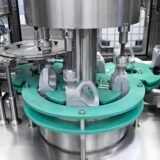
AI to revolutionise grease lubrication, says industry expert
On September 9, Mikael Kruse, product manager for industrial grease at Axel Christiernsson International AB and a board member of the European Lubricating Grease Institute (ELGI), spoke at the ALIA/F&L Asia Lubricant Exhibition in Kuala Lumpur, Malaysia, about the megatrends reshaping the lubricant industry. Kruse highlighted how technology, sustainability, instability, demography and urbanisation are transforming the sector, with a particular focus on the potential of artificial intelligence (AI).
Kruse emphasised the rapid adoption of AI, stating that it will “take a larger share of our reality” at many different stages of the industry. AI presents exciting new opportunities for improving grease lubrication performance. For grease manufacturers, AI offers the chance to grab a larger share of a company’s Total Cost of Ownership (TCO) by providing tailor-made lubrication solutions that better protect costly machinery. It is going to be more challenging, but the earnings are going to be better, says Kruse. He noted that companies are seeking specialised greases that can improve TCO, making lubrication a more critical factor in operational efficiency.
Additionally, the rise of automation, digitalisation, and machine connectivity is transforming maintenance practices. With automated condition monitoring and predictive maintenance becoming more common, maintenance teams will be able to perform their tasks more effectively and with greater precision. This integration of AI-driven technologies will enable proactive maintenance, reducing downtime and boosting overall performance.
Sustainability is another key trend, with growing emphasis on raw materials and reducing friction losses. Kruse noted that sustainability has become a significant purchasing factor for customers, who are keen to promote environmentally responsible practices to their clients. Companies are also under increasing pressure to report their social and environmental performance, following the implementation of the Corporate Sustainability Reporting Directive (CSRD) in January 2023. Kruse pointed out the rising need for sustainability experts within organisations to ensure that sustainability strategies remain competitive and appealing to customers.
Kruse also addressed the challenges posed by global instability. Simplified and more resilient supply chains are essential, leading to a partial reversal of globalisation. There are far more considerations in risk management today compared to five to 10 years ago, says Kruse. He also highlighted the increasing complexity of raw material classifications, and the challenge of choosing raw materials that are suitable for all customers and regions. It is becoming more difficult to develop global products, he says.
Demographic changes present another challenge, particularly in niche sectors like lubricants and greases. The industry is finding it difficult to attract and retain skilled employees, and Kruse emphasized that expertise in grease lubrication is becoming an increasingly valuable competitive edge.
Finally, urbanisation is driving changes in lubrication requirements. “The middle class has different lubrication needs compared to the working class,” says Kruse. As cities expand and the middle class grows, demand for new and improved grease products, particularly in developing regions, is expected to rise. Greases tailored for urban environments are likely to capture a larger share of the market over time.













